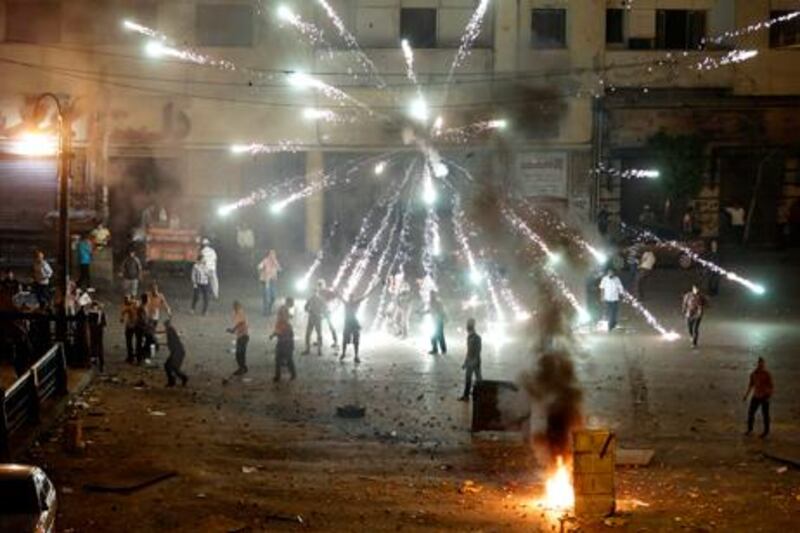CAIRO // Egyptian security forces clashed with supporters of ousted president Mohammed Morsi overnight, leaving seven people dead, health officials said today, overshadowing a visit by a senior US envoy.
The clashes in the heart of Cairo and in adjacent Giza were the first to rock the Egyptian capital since dozens of Morsi supporters were shot dead outside an elite army barracks early last week.
They came just hours after Under Secretary of State Bill Burns – the most senior US official to visit since the army toppled the elected Islamist president on July 3 – appealed for an end to the violence rocking the Arab world's most populous nation.
Two people died in clashes around the central Ramses area near Tahrir Square, while another five were killed in Giza, emergency services chief Mohammed Sultan said.
Health ministry official Khaled Al Khatib said 261 people were also wounded in the clashes, of whom 124 remained in hospital on Tuesday.
Thousands of Morsi supporters had poured onto the streets after the iftar meal with which Muslims break their daytime fast during the holy month of Ramadan, to demand the reinstatement of the ousted president, who has been in custody since hours after his overthrow.
Some of them blocked the October 6 bridge over the Nile in the heart of Cairo, where security forces fired tear gas to drive them back, an AFP correspondent reported.
The protesters responded by hurling rocks at the security forces, triggering fresh volleys of tear gas, with clashes continuing in adjacent Ramses Square and elsewhere late into the night.
The latest deaths brings to more than 100 the number of people killed in Egypt since the coup, according to a tally of confirmed deaths compiled by AFP.
Just hours earlier, Burns had called for dialogue to replace the violence.
"The first priority must be to end violence and incitement, prevent retribution, and begin a serious and substantive dialogue among all sides and all political parties," Burns said.
He was speaking after meeting the general behind the coup, army chief Abdel Fattah Al Sisi, as well as the military-appointed president Adly Mansour and interim premier Hazem Al Beblawi.
Burns said he had called on the military to avoid "politically motivated arrests" amid growing international unease at the crackdown on Mr Morsi's Muslim Brotherhood.
The Brotherhood has refused to play any part in the interim government, which Mr Beblawi has pledged to unveil as early as Tuesday.
A State Department spokeswoman confirmed that Mr Burns had not met any Brotherhood officials during the two-day visit, which he wrapped up on Tuesday.
Not only did the US envoy have no meetings with the Islamists, he was also snubbed by the grassroots Tamarod movement which organised the mass protests against Mr Morsi that led up to the coup.
"We rejected the invitation... because the United States did not stand with the Egyptian people from the beginning," Islam Hammam, one of the group's organisers, said.
Burns declined to comment on Mr Morsi's continued detention, saying only: "We've called on the military to avoid any politically motivated arrests."
Washington has refrained from saying Mr Morsi was the victim of a coup, which would legally require a freeze on some $1.5 billion in desperately needed US military and economic assistance to Cairo.
Several leading Republican lawmakers have called for US aid to be cut because of the army's removal of Mr Morsi.
During his single year of turbulent rule, Mr Morsi was accused of concentrating power in Brotherhood hands, sending the economy into freefall and failing to protect minorities.
But the Islamist leader's supporters say his overthrow was an affront to democracy.
Mr Burns' visit came as the authorities tighten the screws on Mr Morsi's backers, freezing the assets of 14 top Islamists, and with Egypt rocked by a wave of deadly attacks, notably in the Sinai.
On Tuesday, Israel gave Egypt the go-ahead to deploy two infantry battalions to tackle Islamist militants in the restive peninsula, where troop deployments are restricted by treaty, Israeli army radio reported.
The Egyptian army is preparing to go on the offensive against the militants who have escalated attacks since Mr Morsi's overthrow.
Over the past two weeks, the militants have launched almost daily attacks on troops and police, killing several members of the security forces and two Egyptian Christians.





